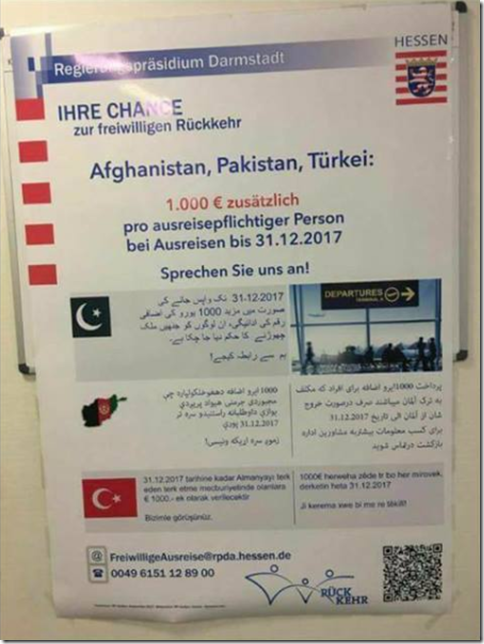Once again, the topic of refugees is causing a stir on the Internet. This time it's about an information poster from the Darmstadt regional council.
This promises every person from Afghanistan, Pakistan and Turkey who is obliged to leave the country €1,000 if they voluntarily leave the country by December 31, 2017.
The requests for this are, for example, like this:
"Description of the fake: I discovered this picture in a group and can't imagine that something like this can be advertised like that."
Far from it, because this poster actually existed, but is no longer used.
So the refugees get paid money for leaving (voluntarily), even though they are obliged to do so??
Basically yes - and this hasn't just been the case recently. We asked the Darmstadt regional council about the information poster and received the following information:
Hello Mr. Sachs,
the poster is an announcement to point out a time-limited special funding for citizens of Afghanistan, Turkey and Pakistan
who are required to leave With a share of around 28 percent, this group of countries is the largest group of those required to leave the country living in Hesse (as of June 30, 2017). People who are obliged to leave the countries mentioned will receive a one-off, age-independent special grant of 1,000 euros if they leave the country in the period from September 1st. - December 31, 2017. This bonus is granted independently of other existing funding programs. The poster is no longer used by the regional council. Further explanation:
Asylum procedures in the Federal Republic of Germany are conducted exclusively at the Federal Office for Migration.
This decides whether people who have entered Germany and applied for asylum receive the right to remain. People who come to Hesse for political or humanitarian reasons receive protection. On the other hand, those who do not have the right to remain after their asylum application has been examined and for whom there is no obstacle to deportation (such as a lack of identification documents, family situation or health status) must be returned to their countries of origin. Asylum seekers in Hesse are informed at an early stage about the possibility of voluntary return and official support in material and financial terms.
The aim of the advisory service is to offer an alternative to forced repatriation, to provide material and financial support for voluntary departure and to facilitate reintegration into the respective home country. Early advice is particularly useful for members of nationalities who have little prospect of remaining. Participation in these consultation appointments is voluntary. Return advice should be provided as early as possible to ensure that people who are still in the ongoing asylum process are aware of state-funded return options.
Experience has shown that after arriving in Germany, people often develop a desire to return during the ongoing process due to a difference between their expectations and reality. In addition, federal funding programs provide special funding opportunities for those who are already returning home during the ongoing procedure (StarthilfePlus).
If potential interested parties were only informed about these funding opportunities after the asylum procedure has been completed, this information would come too late. In addition, the initial reception centers in the state of Hesse offer further advice from the state return advisors in order to discuss the advisor's concerns in more detail in a personal, non-binding conversation. Kind regards,
On behalf of you
Refugees and asylum seekers in Germany have the option of voluntarily returning to their home country. This is organized and supported by “return and reintegration programs” by the BAMF (Federal Office for Migration and Refugees) and IOM (International Organization for Migration) ( https://www.returningfromgermany.de/).
What does the BAMF say about voluntary return?
What are the benefits of voluntary return?
Voluntary return is an alternative to forced return after an asylum application has been rejected.
It makes it possible to leave the country independently and without official accompaniment on a date of your own choosing. This allows the departure to be better planned and prepared. There are also funding programs that encourage voluntary return, e.g. B. support by covering travel costs, start-up assistance and reintegration programs. The various options can be discussed individually as part of a return consultation. If a third-country national who is required to leave the country does not leave voluntarily, he or she must generally bear the costs of his/her repatriation himself.
Back to the poster in question.
Does the Darmstadt regional council really pay this additional €1000? YES! - Because in Hesse, this group of people makes up the largest proportion of those required to leave the country at 28 percent (as of June 30, 2017). This is a time-limited special benefit that is paid independently of other existing funding benefits. The background is that refugees and asylum seekers should be given voluntary opportunity to return home A forced repatriation is more unpleasant and complicated for everyone involved and, above all, more time-consuming. Another argument in favor of financial support for voluntary return is that it saves the state considerable additional costs, such as benefit payments (accommodation, meals, administrative and procedural costs, etc.). But those who are obliged to leave the country also benefit from this program. Refugees and asylum seekers are charged for forced repatriation to their home country.
Mike S., mimikama.org
Notes:
1) This content reflects the current state of affairs at the time of publication. The reproduction of individual images, screenshots, embeds or video sequences serves to discuss the topic. 2) Individual contributions were created through the use of machine assistance and were carefully checked by the Mimikama editorial team before publication. ( Reason )


